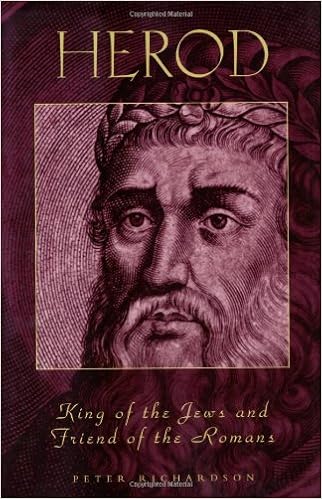Richardson's book focuses on the first Herod. It's a biography based largely around the work of Josephus, and it is focused primarily on the political rise and fortune of the king, recounting much in the way of his war exploits and quarrels within his family.
I came to this book not so much wanting to read about Herod as wanting to read more about the culture from which he derived--the Idumeans. The Edomites, of course, have a long history, but I wanted one that focuse specifically on the culture of the people at this time, the time of the Herods. There was no such book that I could find, so I figured a book about Herod might give me some of that. Indeed, this book did.
But because the focus was, as it should have been, being a biography, on Herod's political career, it was something of a disappointment for me.
Richardson uses fiction techniques to start and end his work. He begins with Herod's death, describing it from the point of view of various peoples who would have known him--radical zealots, Romans, Pharisees, and so on. Indeed, how he was remembered would have depended in many ways on what your own political and religious views were. He was, on some level, very religious, and another, just the opposite. He was an opportunist. He was one who did well for his adopted Jewish people. He was one who sold them out to Rome for his own gain. He was one who did the best he could to support Judah at a time of Roman hegemony. The conclusion reaches for similar points, documenting his various accomplishments.
In between, we get the actual biography, which is, as many histories can be, a bit overwhelming with its accounts of battles. Such rarely keeps me wanting to read, even in books that are outright about wars. After so many, they begin to seem similar, like so much maneuvering to attain specific ends. I tend to prefer to know those ends and in general how they were obtained--not so much the specifics.
The parts that spoke most to me, thus, were those that focused more on Herod's building program, which was impressive. Also of interest--though this too got bogged down in details--was his growing paranoia and the destruction of his family largely by himself. Finally, a mere chapter--but an interesting one--is devoted to his descendents, the tetrarchs that followed him and the final kings.
Subscribe to:
Post Comments (Atom)







No comments:
Post a Comment